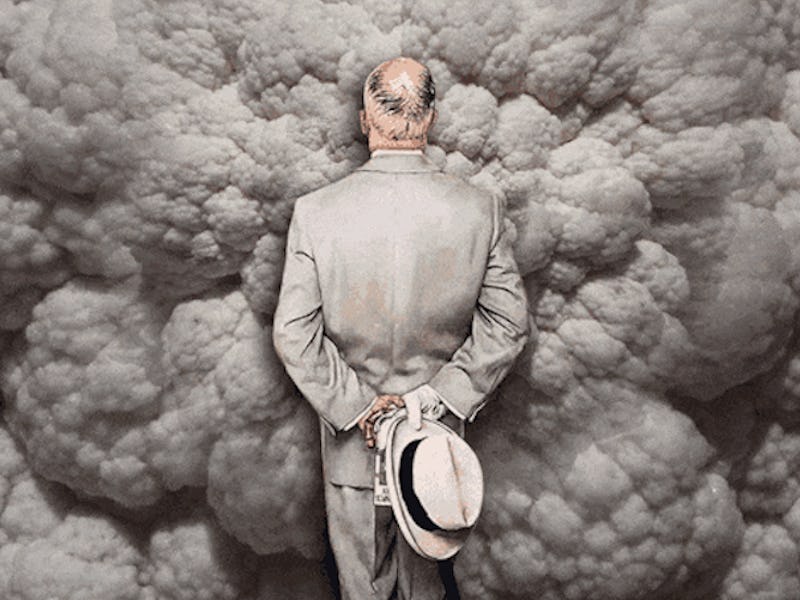How to Stop Nuclear War With a Butcher Knife and Human Sacrifice
A Harvard Law professor had a plan.

If Donald Trump decides to nuke North Korea tomorrow, he can. There’s no deep state coming to the rescue, no brave general who’s going to refuse the order. When folks in nuclear weapon operations question the president’s fitness to make decisions impacting millions of lives, they get fired. A rigid, decades-old infrastructure exists to make sure that if the president of the United States decides to kill a billion people, a billion people will die.
There’s no mechanism for forcing the president to consider the moral weight of a Minuteman missile before launching it. But back in 1981, Harvard law professor Roger Fisher proposed one, in an article published in the Bulletin of the Atomic Scientists with the simple title, “Preventing Nuclear War.” Central to his plan are a butcher knife and the prospect of human sacrifice.
It’s a fascinating essay, and one worth reading in full, as much for the thinking on nuclear deterrence as for its opening anecdote about the time Fisher had to bail out of a B-17 over Newfoundland. But one passage near the end has made its way down through decades of cultural memory, and it comes back up whenever a politician tosses around the idea of a nuclear war, as Trump has done lately.
To some academics, preventing nuclear war should be literally a life-or-death decision.
“I could see the President at a staff meeting considering nuclear war as an abstract question,” Fisher wrote. “He might conclude: ‘On SIOP Plan One, the decision is affirmative. Communicate the Alpha line XYZ.’ Such jargon holds what is involved at a distance.”
Fisher’s idea was to close that distance:
My suggestion was quite simple: Put that needed code number in a little capsule, and then implant that capsule right next to the heart of a volunteer. The volunteer would carry with him a big, heavy butcher knife as he accompanied the President. If ever the President wanted to fire nuclear weapons, the only way he could do so would be for him first, with his own hands, to kill one human being. The President says, “George, I’m sorry but tens of millions must die.” He has to look at someone and realize what death is — what an innocent death is. Blood on the White House carpet. It’s reality brought home.
When I suggested this to friends in the Pentagon they said, “My God, that’s terrible. Having to kill someone would distort the President’s judgement. He might never push the button.”
What would that look like in 2017? Trump, peeved after a particularly insulting remark from Kim Jong Un, pinning Sebastian Gorka against an Oval Office bookshelf and reaching for a sawblade? Would he have the guts? Would anyone?
No one ever really took Fisher’s idea seriously enough to move toward putting it into action. John Mack, in his paper “Toward a Collective Psychopathology of the Nuclear Arms Competition” published in the journal Political Psychology in 1985, cited Fisher’s suggestion as the rare example of a moral deterrent that might actually work. Other writers have made similar use of the idea.
Some similar but less grisly versions of Fisher’s plan have since been proposed. In 1986, the American Nobel laureate in physics, Owen Chamberlain, responded to a request for creative ideas in nuclear deterrence with a letter advocating for placing family members of the 200 most powerful American family members in Soviet cities — and vice versa — in order to impress upon political leaders the real consequences of their hawkishness.
Clearly, neither Chamberlain nor Fisher seriously anticipated that brave volunteers would be going under the knife or shipping to enemy territory for the cause of deterrence. But that doesn’t mean their suggestions were jokes. Instead, they illustrate the seriousness of the moral problem at hand, and the question of whether it is possible to solve through gestures at any scale less than biblical.
One Reddit user, commenting on a thread from May on Fisher’s letter, points out an interesting fact: If Fisher’s plan had been put into practice, and Reagan had found himself in a nuclear exchange with the Soviet Union, the number he would have read out after hacking it out of his attache’s chest would have been, “Zero… zero… zero… zero… zero… zero… zero… zero.”